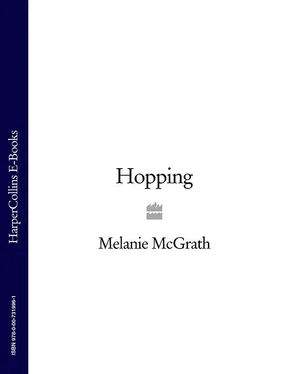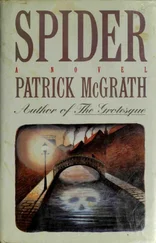On weekday evenings, after work or school, Elsie expected Daisy to play outdoors, and she and Lilly would pass the time spinning tops, or playing pat-a-cake or skipping games, or they would simply walk about the streets of Poplar, hanging off the street lamps and gazing in the windows of the shops. In winter, Mrs Shaunessy would sometimes take pity on them and let them warm themselves at her fire and give them a slice of parkin or a rock bun.
The one exception to this was Friday afternoon, when Daisy was expected carefully to wrap the week’s flowers in tissues, arrange them in a series of old cigar boxes and place them inside a tea chest on to which Joe had grafted some old pram wheels, then help her mother push the chest three miles west along the Commercial Road to Leitkov’s millinery in Aldgate, where they would collect their payment for the week’s work and pick up a new allocation of silk scraps, ribbons, wire, beads and paints. These Elsie stored in a large keel-shaped basket woven from Kentish willow which she kept beside the fireplace to keep the silk from getting damp.
You ever touch this basket without my say-so , Elsie would warn her daughters, and the Sandeman will carry you off to the orphanage so fast you won’t know what’s hit you .
So they never did.
Daisy always looked forward to Friday evenings, when Joe would often bring them some treat he’d lifted from his lighter cargo – a few locust beans or carob pods, some liquorice twigs, a handful of monkey nuts or even a crab or two. While he ate his tea, he would regale his daughters with all that had happened to him that week on the river. Sometimes the tar boats caught fire and the whole of the river would become a wall of blue and orange flame or the water would freeze into a slush littered with icy diamonds. Other times, great fish would rise from the water and tell stories about all the drowned sailors who lived in huge cities at the bottom of the sea, or Joe would uncover a smugglers’ den or spot a mermaid stranded by the tide.
Saturday mornings were taken up with chores, but on Saturday afternoons Joe would take his girls to the Sally Army concerts in Tunnel Park and afterwards treat them to a piece of cold fried fish or a little waxed cone full of whelks and a jam jar of lemonade. On Sundays Elsie would boil up a sheep or pig head. On special occasions she would take a piece of gammon ham or a pork leg to the bakers to roast and follow it with a steamed syrup pudding or a spotted dick. Sunday nights were lived in dread of Elsie’s Monday feints and tantrums.
Today was no exception. If anything, Elsie had been even more grumpy than was usual on a Monday. The Friday before, Leitkov had given Elsie and Daisy twice the usual amount of silk and ribbon and finishings so they might complete enough flowers for the Christmas rush, and Daisy and her mother had worked late on Friday night, then again on Saturday and Sunday, but by Monday morning they had made barely a dent in the piles of scraps and pieces of ribbon in the willow basket, and Elsie decided to keep her eldest back from school in the afternoons so they could get the job done. Now she was ill with one of her innumerable, vague complaints, and Daisy was left trying to get through the task alone.
At five, Elsie rose from her bed in a fluster, glanced at the mantelpiece clock, started muttering to herself about the time and getting Joe’s tea, then, throwing on her coat, announced she was going to fetch a piece of pork belly or maybe a spot of jellied trotter, leaving Daisy with instructions to begin boxing up the flowers and to make sure Franny remained in her room until they were all safely packed away. In recognition of her daughter’s efforts she put a halfpenny in Daisy’s hand, telling her to spend it on muffins or a toffee apple from one of the vendors who paraded their wares around the streets on open trays, accumulating smuts and factory fumes.
Now you be careful while I’m gone. The Sandeman’s watching and don’t you forget it .
Daisy began gathering up the flowers and scraps of unused silk, but within minutes of her mother’s departure, she heard Franny crying and begging to be released from her room. For a while Daisy ignored her, but, eventually, her heart pricked, she climbed the flimsy staircase and opened the bedroom door, thinking she would set her little sister in the yard to play with the dog. When they reached the back door they saw that a greenish fog had come down and Franny shook her curls and screwed her delicate little face into a fist, and Daisy, who could never bring herself to do anything that made her sister unhappy, sat her at the table and told her to sit as still as the clock on the mantelshelf and touch nothing.
No harm might have come of this minor infraction of the rules had the toffee apple man not turned into Bloomsbury Street at precisely that moment, crying:
Apples and flats, apples and flats!
Flats, the discs of toffee that pooled from the toffee apples when they were left to set, were the two girls’ favourite treat, and it was so rare for them to have any money with which to buy anything, that Daisy could not resist the impulse to go out into the street and get some.
Don’t touch nothing. I’ll only be a minute .
Despite the weather, a line of wide-eyed children had already formed around the toffee apple man’s tray and it took Daisy a while to push through the crowd, claim her prize and hurry back to the house. When she did, she realised immediately the mistake she had made in leaving her little sister alone. The scullery looked as though a high wind had passed through it. Silk scraps lay scattered across the lino flooring and between the scraps broken flowers lay, their petals wrenched out or torn or bent at strange angles. There was ribbon strewn across the table, torn and knotted in places. The air was dense with fibres and silk dust and the sheets and pillowcases that had been hanging on string lines beside the fire were spotted all over with little pieces of silk, whose bright colours were already creeping their way across the whiteness of the cotton. And there was Franny sitting in the midst of it with her hands in the basket.
Oh, my knees and knuckles , Daisy said, Franny Crommelin, what have you done?
You said sit still as the clock , Franny cried in a voice ripe with indignation, but the clock moved! Daisy glanced towards the mantelpiece, where the clock was still in the place it had always been, its spot marked out on the mantel in dust and smuts from the fire. But ten minutes had passed and the hands of the clock had indeed moved.
I want the flowers! Franny screamed. You always have the flowers .
Suddenly, Daisy understood why her sister had done what she had. Franny had torn up the silk because she didn’t want Daisy to have anything she didn’t have, and because she knew she could. Already so sure of her power over the family, Franny knew that, whatever she did, her older sister would somehow always shoulder the blame. The thought of it was unbearable to Daisy, yet at the same time she knew it was true.
This time she had gone too far. Half lifting, half dragging, Daisy forced her sister through the scullery, and pushing her out into the yard. As she stumbled on to the flags, Franny uttered a low growl, the sound, Daisy remembered later, of a cornered cat, full of defiance and contempt. She shut the back door behind her, turned the key in the lock and leaned on it, trying to catch her breath. After all she’d been to her little sister, it hadn’t been enough. Franny resented her, hated her even, and wanted her to fail. She began scurrying about, picking up silk scraps, pressing them back into shape with her hands, scooping up the pieces of feather and red and green ribbon, trying to salvage what she could from the mess, but pretty soon Franny began a piteous wailing in the yard, and all the love and protectiveness Daisy felt for her little sister flooded back and she felt disabled and ashamed. Opening the door, she said:
Читать дальше












